Bafta Film Awards 2021: Nomadland and Promising Young Woman win big
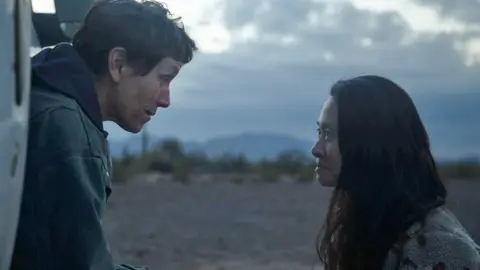 Searchlight Pictures
Searchlight PicturesNomadland, a drama about a woman who lives in a van in the American West after the financial crash, has taken top honours at the Bafta Film Awards.
It scooped four prizes including best film, best actress for its star Frances McDormand and best director.
That made Chloe Zhao only the second woman to win best director in the 53 years of the category's history.
Meanwhile, Sir Anthony Hopkins won best actor for The Father, 27 years after his last competitive Bafta win.
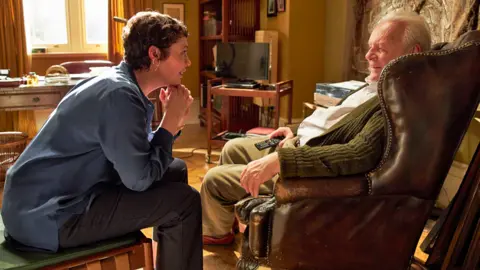 Lionsgate
LionsgateThe 83-year-old, who won for playing a man losing his grip on reality, is the oldest ever winner of the award. But he was not watching Sunday's ceremony and later said he only found out he'd won when he heard cheering from the next room.
"I was sitting here painting, and I heard this cheer go off next door," he said after the ceremony. "I thought, what the hell's happened? I thought they were watching a football match. And they came in and said I'd won."
The key Bafta winners
- Best film - Nomadland
- Best British film - Promising Young Woman
- Best actress - Frances McDormand, Nomadland
- Best actor - Sir Anthony Hopkins, The Father
- Best supporting actress - Yuh-Jung Youn, Minari
- Best supporting actor - Daniel Kaluuya, Judas and the Black Messiah
- Best director - Chloe Zhao, Nomadland

Most winners were watching live and delivered acceptance speeches remotely, with none of the nominees at the Royal Albert Hall in person.
Zhao, who was born in China and is based in the US, referred to her education in the UK when she told the ceremony: "I think I just made my teacher at Brighton College very proud."
Her win comes 11 years after Kathryn Bigelow became the first woman to win best director for The Hurt Locker, and Zhao's victory means she is the first woman of colour to pick up the prize. Nomadland will be released in the UK on Disney+ on 30 April.
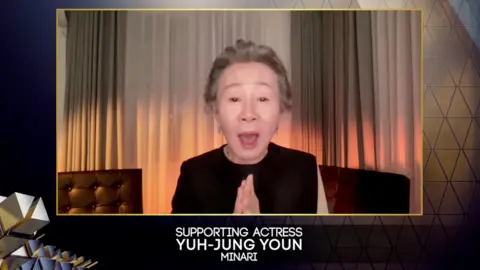 BAFTA
BAFTABritish star Daniel Kaluuya was named best supporting actor for playing Black Panther leader Fred Hampton in Judas and the Black Messiah.
The supporting actress trophy went to South Korea's Yuh-Jung Youn for playing a grandmother in Korean-American drama Minari. Giving her speech in broken English, the 73-year-old said the award meant a lot because Brits were "snobbish" people.
"Every award is meaningful, but this one especially recognised by British people, known as very snobbish people, and they approved me as a good actor so I'm very, very privileged," she said.
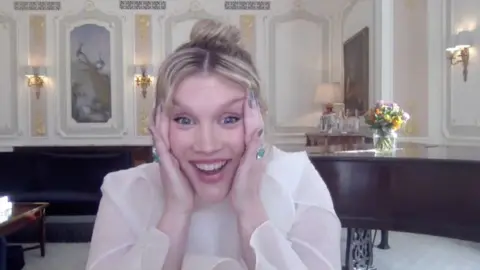 Bafta
BaftaThe prize for best British film went to Promising Young Woman, a revenge thriller about a woman, played by Carey Mulligan, who pretends to be blind drunk when men pick her up in bars and clubs.
Its writer and director Emerald Fennell also won best original screenplay. She joked that everyone involved in the film had made it for "a packet of crisps", and said the experience was "the greatest thing in my life".
Fennell is best known to viewers for her acting as Patsy in BBC drama Call the Midwife and for playing Camilla Parker-Bowles in Netflix's The Crown.
Other Bafta winners included Bukky Bakray. The 18-year-old was named rising star following her first ever acting role in Rocks, in which she played a teenage schoolgirl abandoned by her mother.
The low-budget film, set in east London, was the joint highest nominee along with Nomadland, with seven nominations each. Rocks also won the casting award for finding its group of largely novice young stars.
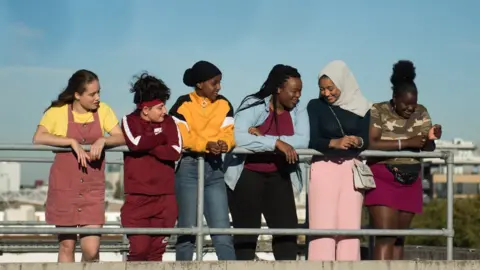 Altitude Films
Altitude FilmsOther films to win two prizes included Disney/Pixar's animated hit Soul; Ma Rainey's Black Bottom, adapted from August Wilson's play about a 1920s blues band; and Sound of Metal, which stars Riz Ahmed as a rock drummer who loses his hearing.
This year's shortlists included a diverse line-up of talent, following an outcry last year when voters only nominated white actors.
This time 16 of the 24 acting contenders came from minority ethnic backgrounds, while 21 were first-time nominees.

More on the winning films:

The night began with a tribute to the Duke of Edinburgh, who was Bafta's first president between 1959 and 1966.
Co-host Edith Bowman said Prince Philip "occupies a very special place in Bafta's history, and our thoughts are with the Royal Family".
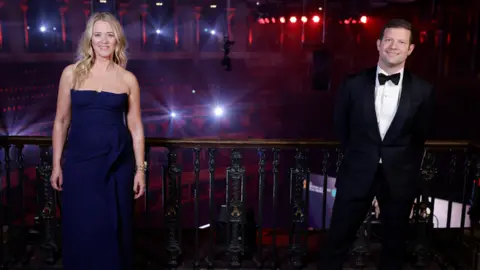 Bafta
BaftaThe Duke of Cambridge had been due to appear in a pre-recorded segment, but pulled out following the death of his grandfather.
This year's Baftas were delayed by two months because of the pandemic, and come two weeks before the awards season reaches its climax with the Academy Awards.
Unlike the Baftas, Oscars organisers want nominees to appear in person and will have a London venue for the first time for UK-based contenders.
Sir Anthony, however, said he would stay in Wales, where he is having "a quiet time", rather than travelling to take part in the Oscar ceremony.

Follow us on Facebook, on Twitter @BBCNewsEnts, or on Instagram at bbcnewsents. If you have a story suggestion email [email protected].
